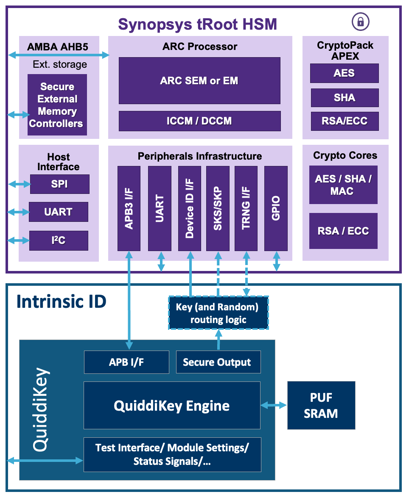The collaboration looks to provide pre-verified PUF and hardware secure module (HSM) security solutions that protect connected devices against advanced security threats.
The Synopsys tRoot HSM IP is now able to offer easy integration with Intrinsic ID QuiddiKey hardware IP implementing SRAM PUF, enabling designers with little security experience to quickly add system and data protection features to their SoC designs.
Cyberattacks are on the rise, according to Check Point Research, with corporate cyberattacks spiking 50% in 2021, reinforcing the need for device-level security.
An embedded HSM is seen as being one of the strongest ways to implement secure authentication, trusted communication, and data protection.
Combining the HSM with PUF technology adds an additional layer of protection by generating secure cryptographic keys based on device-unique variations within the silicon of the chip itself. With the SRAM PUF from Intrinsic ID, the root key is re-generated every time the chip is powered up and is only available (in volatile memory) when needed. This means the key is never present in persistent memory, not even when the chip is powered down.
As the key is not stored on the device, it is significantly harder for attackers to obtain, substantially raising the level of security.
“Protecting highly sensitive data and valuable information in connected systems begins with establishing trust early in the design process,” said John Koeter, senior vice president of marketing and strategy for the Solutions Group at Synopsys. “The integration of Intrinsic ID’s SRAM PUF technology with the highly secure Synopsys tRoot HSM IP enables SoC designers to protect the device and its data at boot time, runtime, and during the communication with other devices or to the cloud.”
“The integration of Synopsys tRoot HSM and QuiddiKey technologies is the next logical step in our long-standing collaboration with Synopsys and will produce many benefits for our mutual customers through delivering more security and a faster time to market,” added Pim Tuyls, CEO of Intrinsic ID.

The Synopsys tRoot HSM is a highly secure module with hardware root of trust that’s been designed to easily integrate into SoCs and provide a scalable solution in support of various security functions for booting up a system, key management, secure storage, debug and updates.
The Synopsys tRoot HSMs with Root of Trust provide designers with a Trusted Execution Environment (TEE) that protects sensitive information and data processing within their SoCs and communication with external entities. The HSMs leverage scalable cryptographic accelerators and secure processors with resilience against physical attacks, as well as unique code protection mechanisms that provide run-time tamper detection and response without the added cost of more dedicated secure memory.
QuiddiKey IP can be applied easily to almost any chip. It uses the inherently random start-up values of SRAM as a PUF, which generates the entropy required in a strong hardware root of trust. QuiddiKey IP can be used with any foundry and any process-node technology and has been deployed and proven in hundreds of millions of devices certified by NIST, EMVCo, Visa, CC EAL6+, PSA, ioXt, and governments across the globe.













